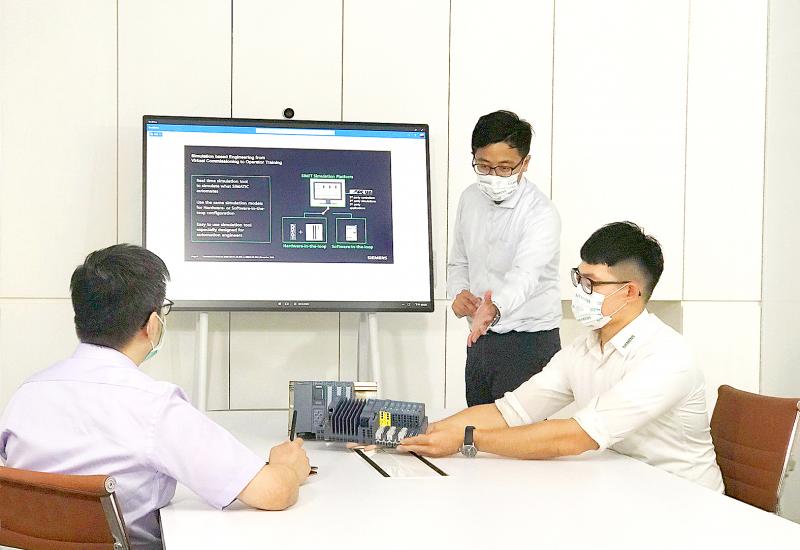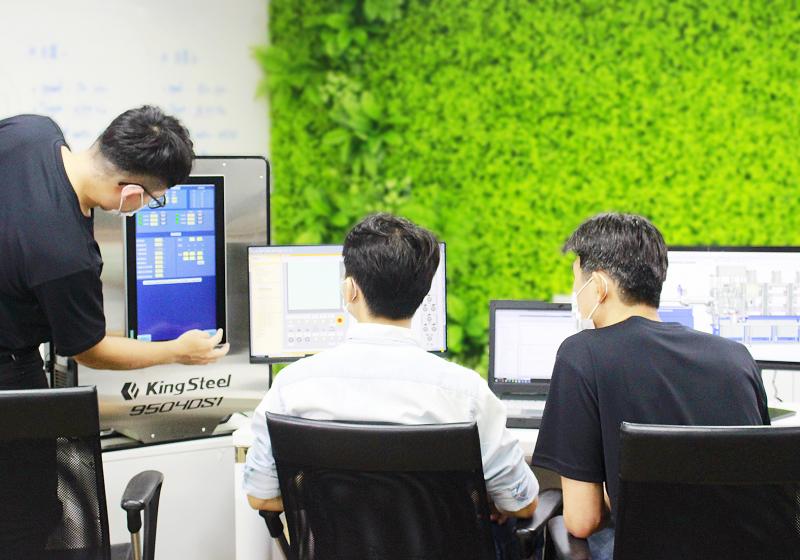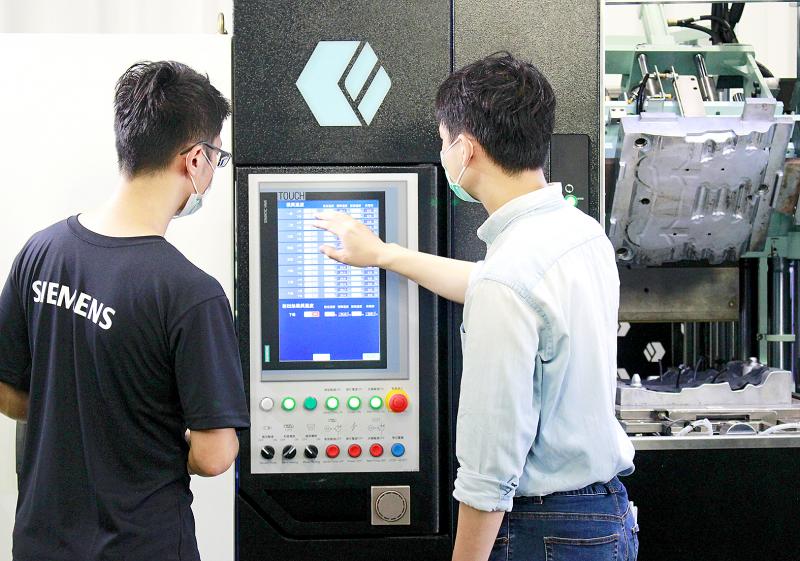The global fourth industrial revolution in smart manufacturing and automation requires intelligent solutions. On Wednesday (Aug. 18), German engineering giant Siemens started a month-long Digital Enterprise Virtual Expo. The expo specially showcases a collaboration project between Siemens and King Steel, Taiwan’s leading producer of shoe-making machinery. The expo demonstration how the project used full-spectrum digital solutions to assist companies in implementing a successful digital transformation of their manufacturing processes.
King Steel manufacturing machinery use Siemens SIMATIC controllers integrated with Siemens Digital Twin digitization solutions to accelerate the development of new machines and more efficient management of component wastage. Siemens and King Steel, two powerhouses within their respective industries, are joining hands and making great strides toward decoding the fourth industrial revolution.
Siemens continues to promote digital industries in Taiwan, this year signing a memorandum of agreement to collaborate with King Steel in the development of key fourth industrial revolution applications for the manufacturing industry.

Photo courtesy of Siemens/King Steel
Siemens Taiwan’s general manager of digital industry, Tino Hildebrand, said: “Taiwan is a world-class center for shoe manufacturing and Siemens is fortunate to have the opportunity to work closely with top manufacturer King Steel to introduce Siemens’ full-spectrum digitalization solutions. Siemens is assisting King Steel to upgrade its shoe machinery design and manufacturing to help drive forward industrial productivity, improve flexibility, realize digital transformation within a fast-changing global market.”?
According to Jim Chen (陳璟浩), special assistant to King Steel chairman, “As we enter a post-COVID-19 era, many of our customers are facing staff shortage problems, particularly involving the production process of rubber soles, which is quite complex.
In the past, one piece of equipment would require between four and six people to operate it, consuming both time and labor cost.

Photo courtesy of Siemens/King Steel
By teaming up with Siemens and employing its highly-efficient SIMATIC S7 series of controllers and integrating this with Siemens digital software, we have been able to significantly increase the production efficiency of our equipment, reducing labor intensity by as much as 80 to 90 percent.
Additionally, during the early stages of the equipment’s development, Siemens’ Digital Twin solution — abbreviated to NX MCD — allows for pre-production virtual reality simulated testing. This greatly shortens the product development timeline and allows King Steel to produce bespoke digital transformation platforms for its customers.
The successful collaboration between King Steel is an important milestone, providing a basis for future cooperation between the two companies, facilitating rapid research and development and producing a competitive edge for King Steel.

Photo courtesy of Siemens/King Steel
For more than 40 years, King Steel has placed an important emphasis on research and development as well as innovation. Responding to industry requirements for digital transformation and smart manufacturing, King Steel has partnered with Siemens to develop a new generation of smart machinery with leading industries in mechatronics, open communication and integrated virtual reality.
Siemens provides a comprehensive integrated automation platform, called the TIA Portal, which pairs the high-performance SIMATIC S7-1500 controller with Digital Twin integrated virtual reality solutions, which also incorporates motor components on the same platform. The fully-integrated mechatronic platform achieves the aim of improving the efficiency of high-end manufacturing machinery research and development.
Siemens emphasizes that its SIMATIC S7-1500 high-performance controller has excellent system functions, an extremely short response time, and the best and safest technical integration.
Paired with the Digital Twin solution and NX MCD mechatronics conceptual design, which incorporates CAD 3D modeling, digital modeling of equipment and machinery can be generated. This allows for simulation testing and adjustments to be carried out during the early stage of the development and procurement, greatly reducing the development time of new machinery and equipment, and saving on development costs.
King Steel is leading position as a world-class producer of shoe-making machinery and equipment has working with Siemens to develop and integrate the latest technologies. Through seamless connection of digital software and hardware, and the use of big data, King Steel has been able to streamline the development process and shorten time-to-market.
As the industry marches on towards the goal of factory automation, King Steel is well-placed to meet the goals of automated smart production and remote, real-time management that its customers demand; helping its clients build smart factories for the future and enhance their international competitiveness.
For more information on the Digital Enterprise Virtual Expo, which runs through to Sep. 17, please visit: https://www.siemensdi.com.tw

‘SWASTICAR’: Tesla CEO Elon Musk’s close association with Donald Trump has prompted opponents to brand him a ‘Nazi’ and resulted in a dramatic drop in sales Demonstrators descended on Tesla Inc dealerships across the US, and in Europe and Canada on Saturday to protest company chief Elon Musk, who has amassed extraordinary power as a top adviser to US President Donald Trump. Waving signs with messages such as “Musk is stealing our money” and “Reclaim our country,” the protests largely took place peacefully following fiery episodes of vandalism on Tesla vehicles, dealerships and other facilities in recent weeks that US officials have denounced as terrorism. Hundreds rallied on Saturday outside the Tesla dealership in Manhattan. Some blasted Musk, the world’s richest man, while others demanded the shuttering of his

ADVERSARIES: The new list includes 11 entities in China and one in Taiwan, which is a local branch of Chinese cloud computing firm Inspur Group The US added dozens of entities to a trade blacklist on Tuesday, the US Department of Commerce said, in part to disrupt Beijing’s artificial intelligence (AI) and advanced computing capabilities. The action affects 80 entities from countries including China, the United Arab Emirates and Iran, with the commerce department citing their “activities contrary to US national security and foreign policy.” Those added to the “entity list” are restricted from obtaining US items and technologies without government authorization. “We will not allow adversaries to exploit American technology to bolster their own militaries and threaten American lives,” US Secretary of Commerce Howard Lutnick said. The entities

Minister of Finance Chuang Tsui-yun (莊翠雲) yesterday told lawmakers that she “would not speculate,” but a “response plan” has been prepared in case Taiwan is targeted by US President Donald Trump’s reciprocal tariffs, which are to be announced on Wednesday next week. The Trump administration, including US Secretary of the Treasury Scott Bessent, has said that much of the proposed reciprocal tariffs would focus on the 15 countries that have the highest trade surpluses with the US. Bessent has referred to those countries as the “dirty 15,” but has not named them. Last year, Taiwan’s US$73.9 billion trade surplus with the US

Prices of gasoline and diesel products at domestic gas stations are to fall NT$0.2 and NT$0.1 per liter respectively this week, even though international crude oil prices rose last week, CPC Corp, Taiwan (台灣中油) and Formosa Petrochemical Corp (台塑石化) said yesterday. International crude oil prices continued rising last week, as the US Energy Information Administration reported a larger-than-expected drop in US commercial crude oil inventories, CPC said in a statement. Based on the company’s floating oil price formula, the cost of crude oil rose 2.38 percent last week from a week earlier, it said. News that US President Donald Trump plans a “secondary